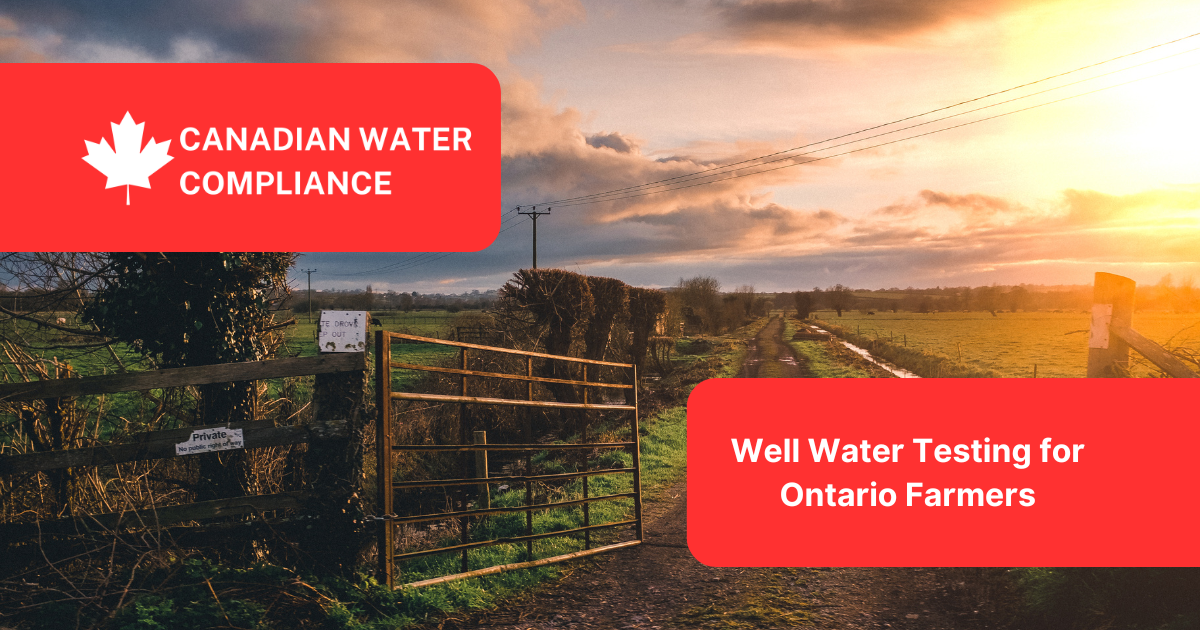
Written By: Canadian Water Compliance | On
For many farmers in Ontario, well water is more than just a convenience—it’s a lifeline. It irrigates crops, nourishes livestock, and sustains households and agricultural operations. Yet, because it falls outside the scope of municipal regulation, the responsibility to ensure that water is safe and clean falls squarely on the shoulders of property owners. That’s why regular well water testing is not only a good practice—it’s a necessity for health, productivity, and regulatory compliance.
Unlike municipal water, private wells are not routinely tested by government agencies. This means contaminants can go undetected for long periods of time, leading to serious health and environmental consequences. On a farm, poor water quality can impact:
Livestock health: Bacteria such as E. coli or high nitrate levels can lead to illness or death in animals.
Crop yield and soil health: Water contaminated with heavy metals or pathogens can damage crops and degrade soil quality.
Human health: Farmers and families using the water for drinking or household use may be exposed to pathogens like Giardia, Cryptosporidium, or harmful levels of lead or arsenic.
Farm-related activities such as fertilizer and pesticide application, manure storage, and septic system runoff can all introduce contaminants into groundwater sources. Common pollutants include:
Nitrates and Nitrites: These can cause blue baby syndrome and other health issues in humans and livestock.
Bacterial Pathogens: E. coli, total coliforms, and other fecal bacteria can pose serious health risks.
Pesticide Residue: Improper storage and usage can lead to groundwater contamination.
Heavy Metals: Naturally occurring elements like arsenic or lead may leach into well water depending on local geology.
While there’s no legal requirement for routine well water testing on farms, Ontario’s Ministry of Health strongly encourages private well owners to test water at least three times per year for bacteria. For agricultural operations, additional testing for nitrates, pH, metals, and chemicals is also recommended.
In cases where water is being used for produce irrigation or food production, testing may be required under O. Reg. 119/11 (Produce, Honey, and Maple Products) or other food safety programs such as CanadaGAP.
Test seasonally – Especially during spring thaw, after heavy rainfall, or during periods of drought when contaminants are more likely to leach into aquifers.
Keep wellheads secure – Ensure they are above ground, sealed properly, and located away from potential contamination sources.
Maintain detailed records – Keeping track of test results, maintenance, and issues can help detect trends or recurring problems.
Inspect your system regularly – Look for signs of wear, cracks, or potential contamination points in your well structure and water delivery systems.
Farms found to be using contaminated water may face liability under food safety regulations, environmental laws, or civil lawsuits. An outbreak of waterborne illness linked to your water supply can have devastating consequences—damaging your reputation, your productivity, and your bottom line.
Testing and treatment are a fraction of the cost of a contamination-related crisis.
Canadian Water Compliance offers tailored well water testing services for agricultural clients across Ontario. Our certified technicians collect samples directly from your site, ensuring compliance with local regulations and laboratory testing standards. Whether you're concerned about livestock health, irrigation suitability, or food safety protocols, we provide clear, accurate reports and ongoing support.
With every test, you're not just protecting your water—you’re protecting your farm, your family, and your future.